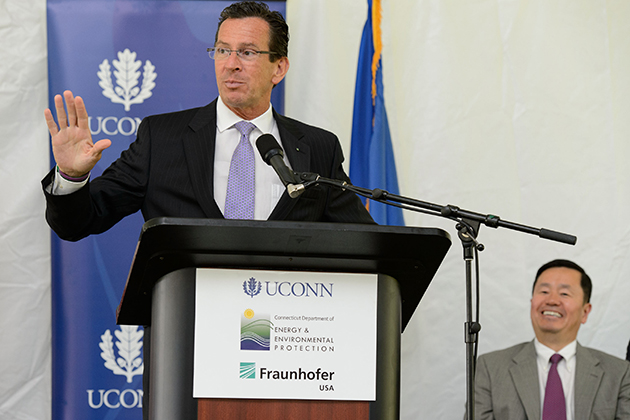
The Fraunhofer Center for Energy Innovation at UConn, a partnership between UConn, Fraunhofer USA, and the Connecticut Department of Energy and Environmental Protection, was officially launched by Gov. Dannel P. Malloy today at the University’s Depot Campus.
The center will focus on developing advanced technologies related to energy storage, fuel cells, power management, and distribution. One of just seven Fraunhofer research centers in the country, it will be temporarily located at the Depot Campus, with plans to relocate it to the new UConn Technology Park when it opens.
Fraunhofer USA Inc., a subsidiary of the European company Fraunhofer-Gesellschaft, performs applied research under contract for federal and state governments, multinational corporations, and small to medium-sized companies.
Fraunhofer USA Inc. President Georg Rosenfeld, German Consul General to the U.S. Rolf Schütte, the state Commissioner of Energy and Environmental Protection Daniel Esty, and UConn President Susan Herbst joined Malloy for the launch. The event was attended by more than 170 researchers, government officials, community members, and students.
We expect to see technological breakthroughs that will help deliver a cheaper, cleaner, and more reliable energy future for Connecticut, the nation, and the world.
“This partnership between the state, UConn, and Fraunhofer USA is a welcome and important collaboration when it comes to finding solutions to some of the most pressing energy challenges we face,” said Malloy. “With the resources, talent, and expertise of UConn and Fraunhofer, we expect to see technological breakthroughs that will help deliver a cheaper, cleaner, and more reliable energy future for Connecticut, the nation, and the world. I deeply appreciate the efforts of Presidents Rosenfeld and Herbst and their teams in establishing this partnership.”

Said Herbst, “This center, which builds on UConn’s considerable strengths in energy innovation, strives to accelerate the global adoption and deployment of cost-effective and sustainable energy technologies, while nurturing a new generation of energy experts to help drive economic development.”
Under the leadership of director Prabhakar Singh, the Fraunhofer Center for Energy Innovation will develop highly efficient and cost-effective energy conversion and storage systems. Working with industry, the center’s research and development will concentrate on modern functional materials, such as metals, ceramics, micro- and nanostructures, as components for fuel cells and electrolyzers.
“The Fraunhofer Center for Energy Innovation combines the expertise of the founding partners for the development and commercialization of new materials and technologies to improve future energy production and storage owing to an efficient use of resources,” said Singh, who is also a professor of materials science and engineering. “The aim is to accelerate the global supply of affordable and sustainable energy technologies.”

Fraunhofer USA is a subsidiary of Fraunhofer-Gesellschaft, Europe’s largest applied R&D organization, which has 66 institutes and research units and an annual research budget of $2.5 billion.
“The sustainable, efficient and environmentally friendly use of energy is one of the major global challenges of the future,” said Fraunhofer President Professor Reimund Neugebauer. “Consequently, we combine our advanced energy competencies in the USA with an excellent research partner, the University of Connecticut. The Fraunhofer Center for Energy Innovation expands Fraunhofer USA’s portfolio of energy-related technologies, and will closely cooperate with the Fraunhofer Center for Sustainable Energy Systems in Boston.”
CEI is the seventh Fraunhofer research center in the United States. Each works closely with a major research university, including the University of Michigan, Michigan State University, University of Maryland, University of Delaware, Boston University, and Massachusetts Institute of Technology.

The new research center continues the University of Connecticut’s rich history of excellence in energy innovation. In 2001, the Connecticut Global Fuel Cell Center, now the Center for Clean Energy Engineering, was founded at UConn to advance core science, technological development, and commercialization of fuel cells. In 2006, a partnership between the Connecticut Clean Energy Fund and three leading energy industry supporters enabled UConn to establish the Eminent Faculty Initiative in Sustainable Energy. The initiative is sustained by more than $2 million in state funds annually, along with ongoing industry support.
“The work of the CEI will lead to advances and widespread use of technologies that promise to revolutionize the energy world,” said Esty. “By unleashing the potential of new materials to help generate power, and unlocking the potential of energy storage, the CEI will allow for quicker and greater deployment of alternative sources of power, freeing us from reliance on fossil fuels and all of the political and environmental risks they entail.”


